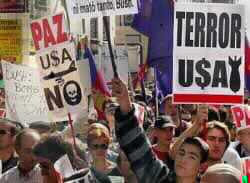The United States and Britain backed up threats of war on Iraq with diplomatic arm-twisting of reluctant allies on Sunday, as U.N. arms inspectors prepared for talks with Baghdad on resuming their work in the Arab state. The Iraq crisis also appeared to influence events in the Middle East, where Israel announced an end to a siege of Palestinian President Yasser Arafat's headquarters that could have complicated U.S. plans for any strike against Baghdad.
President Bush had demanded that Israel lift the 10-day blockade. U.S. officials denied any link with Iraq, but the siege had angered Arab states Washington seeks as allies in its stand-off with Iraqi President Saddam Hussein.
Washington suffered an apparent setback in its efforts to persuade a skeptical Russia to support its proposed Security Council resolution demanding Iraq accept tough new rules for weapons inspections or face military action.
Interfax news agency quoted informed sources as saying Russia was unhappy with the draft. U.S. Undersecretary of State Marc Grossman had held talks on Saturday in Moscow with Foreign Minister Igor Ivanov.
Israeli Prime Minister Ariel Sharon began a 48-hour visit to Moscow. Israel, unlike Russia, favors U.S. military action against Baghdad, but believes Moscow's traditional ties with Arab states could make it a go-between in the Middle East crisis.
A British envoy arrived in China on a parallel mission to win backing from veto-holding Security Council members for the U.S. resolution, which gives Iraq one week to accept demands to disarm and 30 days to declare any weapons of mass destruction programs.
UN INSPECTORS MEET IRAQI OFFICIALS
In Vienna, U.N. weapons inspectors met to prepare for talks with Iraqi officials on Monday on details of their return to Baghdad after nearly four years.
The chief U.N. weapons inspector, Hans Blix, is to take part in the talks -- due to finish on Wednesday -- which follow three unsuccessful attempts this year to make practical arrangements for a resumption of inspections.
The Vienna talks are the first test of Iraq's cooperation since Sabri's September 16 letter to U.N. Secretary-General Kofi Annan saying the inspectors could return without preconditions.
Blix intends to make the same requests he did at a meeting with Iraqi officials in July: offices, transport, communications, accommodation, escorts and landing sites for aircraft.
Iraq has promised a current list of equipment and materials with both civilian and military uses and how they are deployed.
IRAQI OPPOSITION GROUPS MEET IN TURKEY
In Turkey, Iraqi groups opposed to Saddam called at the end of a three-day conference for an end to his rule. The groups included members of Iraq's Kurdish, Turkmen and Assyrian minorities.
U.S. Assistant Secretary of State for European Affairs Elizabeth Jones arrived in NAT member Turkey for talks on Monday with Foreign Minister Sukru Sina Gurel and the military's deputy chief of general staff General Yasar Buyukanit.
The U.S. embassy said Jones might meet Prime Minister Bulent Ecevit, who has voiced Turkish opposition to a war on Iraq, saying conflict could damage its fragile economy and stir unrest among its Kurds in the region bordering Iraq.
The United States uses a Turkish base to enforce a "no-fly" zone over northern Iraq since the Gulf War's end in 1991.
Iraqi Deputy Prime Minister Tareq Aziz was to arrive in Turkey on Monday. He is expected to meet Ecevit and President Ahmet Necdet Sezer to drum up support against any U.S. offensive.
PHOTO CAPTION
Thousands of demonstrators take to the streets of Madrid September 29, 2002 to protest against a possible U.S.-led military strike on Iraq. (Andrea Comas/Reuters)
- Author:
& News Agencies - Section:
WORLD HEADLINES


 Home
Home Discover Islam
Discover Islam Quran Recitations
Quran Recitations Lectures
Lectures
 Fatwa
Fatwa Articles
Articles Fiqh
Fiqh E-Books
E-Books Boys & Girls
Boys & Girls  Hajj Rulings
Hajj Rulings Hajj Fatwas
Hajj Fatwas














